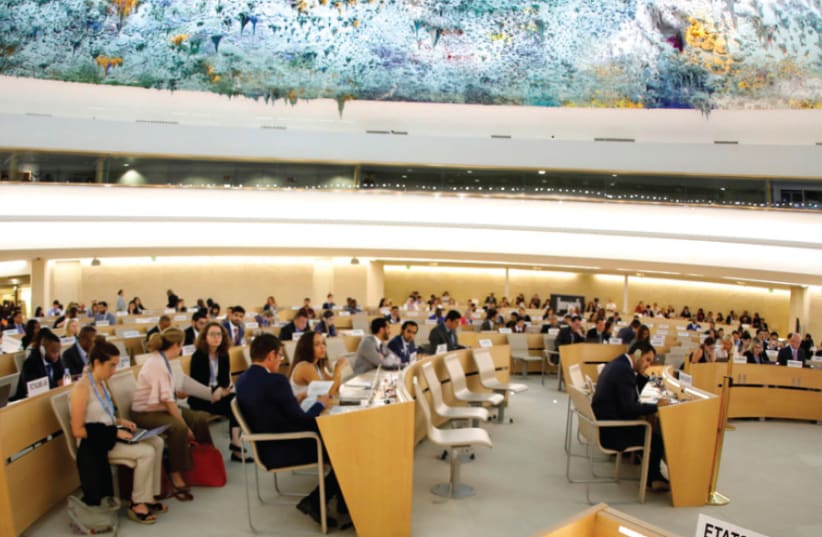The United Nations Human Rights Council approved a pro-Durban resolution on Monday 32-10, after the United Kingdom called for a roll-call vote and prevented the text’s anticipated passage by consensus.
“Racism should be tackled in all its forms, and regrettably, for far too long, the UN has downplayed the scourge of antisemitism. This must end,” British envoy Simon Manley told the 47-member UNHRC as it wrapped up its 48th session in Geneva.
Israel had worked behind the scenes to sway UNHRC members to oppose the resolution, which is approved every two years, and to refuse to allow it to pass by consensus. Israel is not a member state and was therefore unable to call for a vote.
But initially, UNHRC nations that only last month had boycotted the UN General Assembly event in New York commemorating the 20th anniversary of the contentious World Conference against Racism in Durban, South Africa, in 2001, were reluctant to take a similar stand against that document.
On Monday, however, 10 countries opposed the resolution: Austria, Czech Republic, Denmark, France, Germany, Italy, Netherlands, Poland, Ukraine and the UK.
Five countries abstained: Bulgaria, Japan, Marshall Islands, Republic of Korea and Uruguay.
The UK was committed to the goals of the resolution and the Durban conference when it came to combating racism, racial discrimination, xenophobia and related intolerance, Manley said.
“Discrimination of any kind has no place in society, and we will continue to treat all forms of discrimination with equal seriousness,” he said.
Great Britain was one of the first countries to ratify the International Convention for the Elimination of Racial Discrimination and has been active on issues relating to racism in the UN, Manley said.
Britain, however, is opposed to the multiple references to the original 2001 Durban conference, “given the historic concerns over antisemitism,” he said. Nor can it “accept the references to the original 2001 Durban Review Conference or the positive language welcoming the recent commemorative event in New York,” he added.
The UK, which is a UNHRC member, was one of “nearly 40 states” that had “made the decision not to take part” in the New York event, Manley said.
“We think we all need to ask ourselves why so many states stayed away and how we can move forward,” he said. “If we are to be able to forge a consensus in the future, then it is clear that we must come together to find a new approach.”
“The UK is clear that we will not attend future iterations of the Durban Conference while concerns over antisemitism remain,” Manley concluded as he called for a roll-call vote.
Australia, which is not a UNHRC member state, signed itself onto the British statement.
Monday’s vote marked the second time the UNHRC had reaffirmed the Durban conference.
Cuba included a paragraph affirming the 2001 global parley in a resolution on a democratic and equitable order that was approved 30-14, with three abstentions.
The initial conference produced a wide-ranging document that condemned racism, which was hailed by African countries. But it also singled out Israel, which opponents of the declaration have said links the Jewish state with racism even as the declaration condemned antisemitism.
An initial draft of the Durban conference in 2001 had initially attempted to blatantly equate Zionism with racism. Some of the NGOs present held sideline events that accused Israel of genocide and questioned whether Hitler’s murder of six million Jews in the Holocaust was justified.
The Protocols of the Elders of Zion, Hitler’s infamous antisemitic text, was sold at the event.
None of the later documents related to Durban have repeated that kind of antisemitism, nor have they singled out Israel. The original text, however, has not been amended, and it is continuously referenced.
Israel’s mission to the UN in Geneva thanked the countries that took a stand at the UNHRC.
They voted “against the language referring to the Durban process, which has been repeatedly tainted with #antisemitism. Israel’s commitment to fighting all forms of racism & discrimination and to promoting tolerance & equality remains steadfast,” the mission tweeted.
Cameroon, however, said those nations had erred in opposing the resolution. The charge that the document was antisemitic was part of a “false narrative” to delegitimize a significant tool in the fight against antisemitism, its envoy said.
“The text is actually strong in the fight against antisemitism and has a number of paragraphs that address this issue,” the envoy said, adding that it even calls to criminalize such activity, “which renders it a precedent-setting document.”

